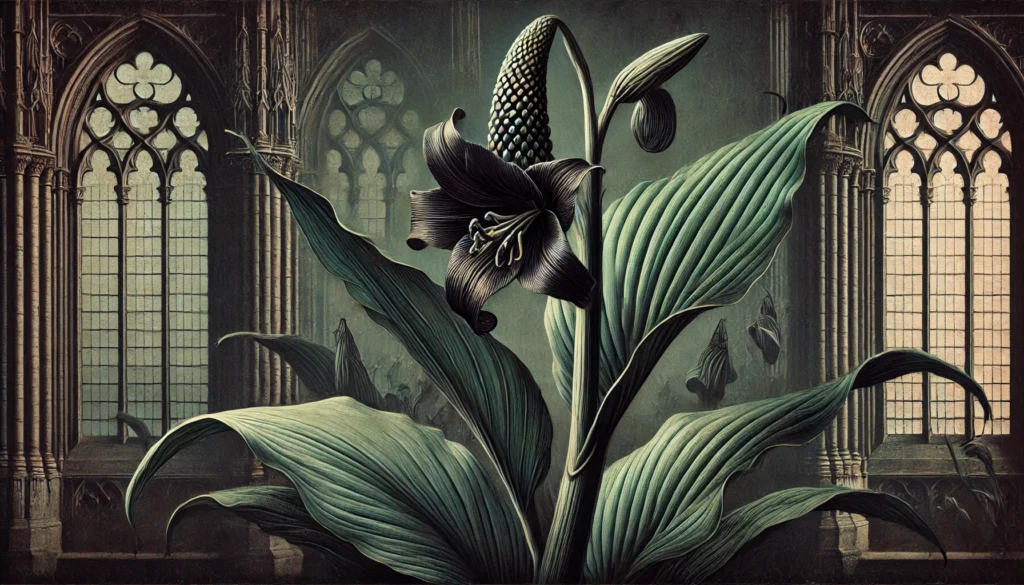

Home » Cat Plants » Can the Solomon’s Lily Plant be Harmful to Cats?

Solomon’s Lily, also known as Arum Lily or Calla Lily, is a popular ornamental plant that can be toxic to cats. While cats are not necessarily allergic to this plant, ingesting any part of it can cause severe poisoning.
Solomon’s Lily contains insoluble calcium oxalates, which are the main toxic compound responsible for its toxicity to cats. This plant is commonly found in gardens, bouquets, and as potted plants in homes.
Ingestion may cause mild gastrointestinal upset, but is generally not life-threatening.
Ingestion can result in mild symptoms like vomiting, diarrhea, or drooling. Rarely fatal but may require veterinary care.
Eating these plants can lead to more pronounced symptoms like abdominal pain, lethargy, or difficulty breathing. Veterinary intervention may be necessary.
Ingesting even small amounts can cause severe symptoms like organ damage, seizures, or cardiac failure without rapid treatment.
All parts of these plants are extremely poisonous to cats and can quickly lead to death, even with immediate veterinary care.
** Please note: Please note that toxicity level can vary based on the amount ingested and the specific cat. It's always best to keep these plants completely inaccessible to cats and seek immediate veterinary care or call the poison hotline if you suspect your cat has ingested any part of a toxic plant.
If a cat has ingested any part of a Solomon’s Lily plant, they may exhibit the following symptoms:
In severe cases, ingestion can lead to difficulty breathing, seizures, and even death. If you suspect your cat has eaten any part of this plant, seek veterinary care immediately.
If you bring your cat to the veterinarian suspecting Solomon’s Lily poisoning, they will likely follow these steps to diagnose and treat your pet:
For more information on how veterinarians diagnose and treat plant poisoning in cats, visit the ASPCA Animal Poison Control Center.

A: Yes, Solomon’s Lily is toxic to cats. It contains insoluble calcium oxalates, which can cause painful reactions like vomiting and difficulty swallowing if ingested.
A: If a cat eats Solomon’s Lily, it may experience symptoms such as drooling, vomiting, and oral irritation. Immediate veterinary care is crucial to prevent further complications.
A: Yes, all parts of the Solomon’s Lily plant, including the leaves and stems, are toxic to cats. These parts contain harmful compounds that can cause serious health issues.
A: Even small amounts of Solomon’s Lily can be harmful to cats. Ingesting any part of the plant can result in toxic reactions, so it’s essential to keep it out of reach of pets.
A: Solomon’s Lily poisoning is rarely fatal but can cause significant discomfort and health problems in cats. Quick treatment is essential to alleviate symptoms and ensure recovery.
A: If your cat ingests Solomon’s Lily, contact your veterinarian immediately. Early intervention can reduce the toxic effects and protect your cat’s health.
Solomon’s Lily, or Arum Lily, is native to southern Africa and has been cultivated for centuries as an ornamental plant. It was named after the biblical King Solomon, possibly due to its elegant and regal appearance.
The plant gained popularity in Victorian England as a symbol of purity and was often featured in wedding bouquets. Today, Solomon’s Lily is widely grown in gardens and as a potted plant worldwide, despite its toxicity to pets and humans.
Please note: The information shared in this post is for informational purposes only and should not be considered as veterinary medical advice.
🐾 A hilarious or heart-melting cat video
🐾 Our latest paws-on review of a cool cat toy